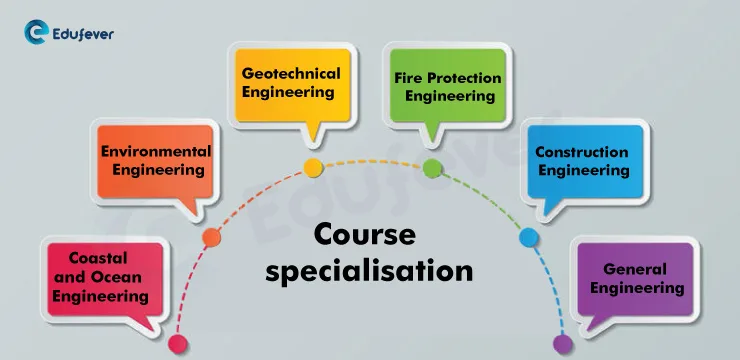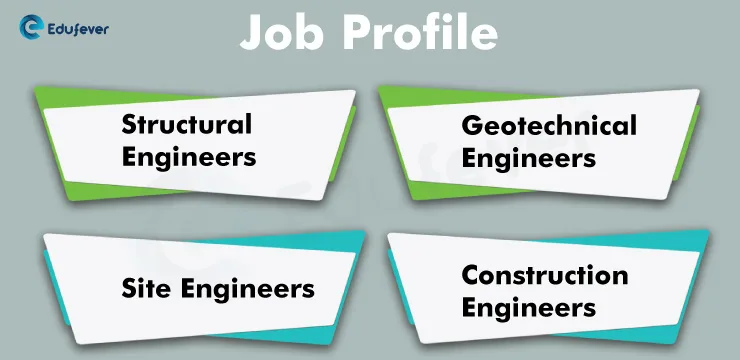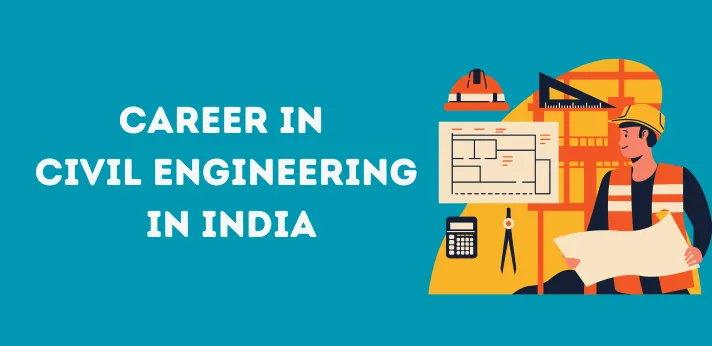Career in Civil Engineering in India: India is fast fast-growing country and is experiencing fast urbanization and large-scale infrastructure growth, offering opportunities for a career in Civil Engineering. A Civil engineer is essential in designing skyscrapers and creating crucial systems like water and transportation in megacities. If you’re intrigued by buildings and enjoy solving problems, this field offers a fulfilling journey with many chances to help shape India’s future.
As admission and entrance exams are approaching, it is important to decide what exactly you want to pursue. If you’re interested in civil engineering and want to learn more about it, keep reading this article as it will provide you deep insight into civil engineering courses.
[Index]
What is Civil Engineering?
Civil Engineering is one of the core branches of engineering. The course focuses on constructing infrastructure and artificial structures. In India, the scope of civil engineering is particularly high compared to other engineering disciplines.
Students enrolled in Civil Engineering courses learn about designing, constructing, and maintaining buildings. They also learn how to make structures safe and resilient against natural or man-made threats. Moreover, civil engineering isn’t limited to just building buildings; it also includes industrial, road, railway, and metro construction, among other things.
Course Overview
- This branch of engineering is not just about learning and pursuing a career. It is also a form of art that requires creativity.
- Civil engineers construct a strong building and make it stand out from others by making it appealing.
- This branch is not confined to composing a concrete building or dam. Still, it also gives information about fire management, accidental escape management, safety from natural disasters, etc.
Specialisation in Civil Engineering
Here is the list of Specialisation courses in Civil Engineering, let’s explore:
| Coastal and Ocean Engineering | Environmental Engineering |
| Geotechnical Engineering | Fire Protection Engineering |
| Construction Engineering | General Engineering |
| Structural Engineering | Irrigation Engineering |
| Bridge Engineering | Materials Engineering |
| Land Development | Urban Engineering |
| Hydraulic Engineering | Water Resources Engineering |
| Transportation Engineering |

Eligibility Criteria
Below are the basic eligibility criteria for admission to UG and PG-level civil engineering courses.
| Course | Eligibility Criteria |
| For UG courses | The candidate must have cleared the 12th class from a recognised board. In addition, core subjects, i.e. Physics, Chemistry and Mathematics, are mandatory. A minimum of 45% to 50% marks is required in the 12th class, and the admission process to the B. Tech program is done through the entrance exams such as – JEE Main, JEE Advanced, MHCET, and KCET. |
| For PG courses | Candidates should have passed a B. Tech degree with a minimum passing percentage in the aggregation of all subjects studied in the undergraduate program. The admissions are made through the entrance exam, such as – the GATE score merit list. |
Entrance Exams For Civil Engineering
Given below is the list of top engineering entrance exams in India.
| Entrance Exam | Conducted By |
| JEE Main | National Test Agency |
| VITEEE | VIT University |
| BITSAT | Birla Institute of Technology and Science |
| KIITEE | Kalinga Institute of Industrial Technology |
| MHT CET | Maharashtra State Common Entrance Test Cell |
Top Colleges for Civil Engineering
There are several best colleges and universities for a career in civil engineering in India. A few of them are listed below.
Fee Structure
The basic fee structure for civil engineering is mentioned here.
| Name of The Institute | Specialization | Overall Average Program Fees |
| IIT Bombay – Indian Institute of Technology (IITB) | Fees For MTech in Transportation System Engineering | INR 50,000 |
| IIT Kharagpur – Indian Institute of Technology (IITKGP) | Fees For BTech in Civil Engineering | INR 8.52 Lakh |
| IIT Madras – Indian Institute of Technology Chennai (IITM) | Fees For BTech in Civil Engineering | INR 9.38 Lakh |
| IIT Kanpur – Indian Institute of Technology (IITK) | Fees For BTech in Civil Engineering | Fees For BTech in Civil Engineering are INR 8.27 Lakh |
| IIT Roorkee – Indian Institute of Technology (IITR) | Fees For BTech in Civil Engineering | INR 8.42 Lakh |
Career in Civil Engineering
As we have already mentioned, one of the oldest branches of engineering offers a promising career since it is recognized as the backbone of social and industrial development. Over the years, civil engineers have constructed various structures such as sports arenas, tall buildings, hospitals, bridges, dams, and more.
Careers in Civil Engineering are not limited to earning by participating in field jobs. Subsequently, a civil engineer can work as an infrastructure consultant or a construction map designer and get their own private office.
| Job Profile | Job Description |
|---|---|
| Structural Engineers | They design, plan and supervise the construction of infrastructural projects like buildings, bridges, etc. They also take care of alteration and extension to existing properties or structures. |
| Geotechnical Engineers | The primary responsibility of Geotechnical engineers is to create projects and find solutions to the problems that are related to geology. |
| Site Engineers | They take responsibility for security, safety, health, organizing, and supervising material and people working at the site. They are part of the site management team. |
| Construction Engineers | The main task includes – planning, directing, and supervising large construction projects. They act as leaders and intermediaries on construction projects and ensure everything about the project is safe, smooth and structurally sound. |

Advantages and Disadvantages of Civil Engineering
Every field has its Advantages and disadvantages, including civil engineering. Let’s explore some of its advantages and disadvantages.
| Advantages | Disadvantages |
|---|---|
| Most often, skilled and qualified civil engineers experience decent pay scales. The quality of the college from which one seeks the course plays an essential role in determining the salary package. | Several times, projects can be testing and challenging. Deadlines can be hard to meet. Such conditions could often result in long and tough working hours. It is not unusual to see civil engineers work long shifts to complete their projects. |
| As already said, civil engineering is a core branch of engineering. It is also called an evergreen branch. Therefore, most core branches generate better job opportunities (compared to other engineering branches). | Working outdoors could be fun for some. But it is not true in the cases of several people. Civil engineers may end up working in some remote and hostile areas. While it could be fun, many engineers don’t enjoy it! |
| Civil engineers design and build things. They are competent in designing and building structures like bridges, roads, stadiums, sewer systems, houses etc. Also, they can touch the lives of people straight through their work. | A project site is filled with huge construction machinery, vehicles, building materials etc. Dust, sharp tools, pollution, fire and work accidents are common occurrences at many work sites. |
| It is a profession where you can express your creativity, problem-solving skills and technical experience. To sum up, you won’t be bored with your work. You’ll always be motivated and psychologically stimulated. | Civil engineers usually design and build structures. These structures usually have high strategic, commercial and political value. Planning, calculation, and effort must be put into constructing such structures. An eye for detail is something that civil engineers must have. This increased liability often leads to pressure (in the case of civil engineers). Mistakes can have dire consequences. |
Salary
A person’s salary package depends on their overall expertise, college of graduation, personality, skills, and various other factors.
| Course | For Fresher | For Mid Expertise | For Experienced |
| Civil Engineering | INR 3.5 Lakhs | INR 6-7 Lakhs | INR 11-14 Lakhs |
Top Recruiters
There is a huge opportunity for a Civil engineer as they can start working in both private and government sectors. They can secure positions in construction, transportation, infrastructure, and various other sectors such as energy production, gas distribution, and water resource management.
Here is the list of top companies hiring civil engineers:
| Gannon Dunkerley & Company | Bridge and Roof Company |
| Aga Khan Planning and Building Services | MARG Limited |
| Metro Tunneling Group | Nagarjun Construction Company |
| Ayas Shilpa | Sobha Developers Ltd. |
| Sadbhav Engineering | Punj Lloyd |
| Unitech | Shapoorji Pallonji & Company |
Frequently Asked Questions (FAQs)
Which are the best colleges in India to pursue Civil Engineering?
Undoubtedly, the IITs and NITs are the best for engineering in India. However, in terms of private colleges, Galgotia College, GL Bajaj, VIT, and SRM are some of the best colleges.
What are the average fees for pursuing a civil engineering course in a UG programme?
On average, it can cost from 1 lakh to 6 lakhs. But it depends on which college type you choose, government or private.
What is the advantage of JEE exams in respect of this course?
Clearing JEE exams gives the student a chance to choose from a plethora of top colleges, as the marks of the JEE exam highly determine a student’s admission.
